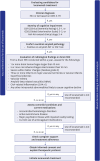Practical Guide of the Korean Association for Geriatric Psychiatry to Anti-Amyloid Monoclonal Antibody Therapy for Alzheimer's Disease: Focused on Lecanemab
- PMID: 40696527
- PMCID: PMC12284303
- DOI: 10.3346/jkms.2025.40.e215
Practical Guide of the Korean Association for Geriatric Psychiatry to Anti-Amyloid Monoclonal Antibody Therapy for Alzheimer's Disease: Focused on Lecanemab
Abstract
The advent of anti-amyloid monoclonal antibody (mAb) therapies represents a paradigm shift in the treatment of Alzheimer's disease (AD), from symptomatic relief to disease modification. Lecanemab, a humanized mAb targeting soluble Aβ protofibrils and plaque, received regulatory approval in Korea in July 2024, following global randomized controlled trial data demonstrating its efficacy to reduce amyloid burden and slow cognitive decline. However, the introduction of such therapies into routine clinical realm presents several practical and systemic challenges, particularly in the context of Korea's unique healthcare infrastructure and reimbursement environment. In response, the Korean Association for Geriatric Psychiatry has developed the first comprehensive domestic guidance to facilitate the safe, evidence-based, and patient-centered use of anti-amyloid mAb therapies, first focused on lecanemab. This practical guide goes beyond simple eligibility criteria. It provides detailed recommendations on clinical and imaging-based candidate selection, amyloid-related imaging abnormalities (ARIA) risk stratification and monitoring protocols, infusion workflows, adverse event management strategies, and multidisciplinary coordination within hospital systems. It also emphasizes shared decision-making and outlines how to navigate situations where treatment is not appropriate, such as in patients with advanced dementia, high-risk magnetic resonance imaging findings, or poor treatment adherence, reinforcing that non-treatment can also represent a legitimate, evidence-based clinical decision. The guidance further highlights the urgent need to generate real-world data that reflect the treatment experiences of Korean patients. Multicenter collaboration will be essential for collecting data on adherence rates, ARIA incidence, cognitive outcomes, and functional trajectories, which in turn can inform policy decisions, insurance reimbursement models, and future updates to clinical guidelines. This publication represents the first nationwide roadmap in Korea to support clinicians in the appropriate integration of monoclonal antibody therapies for AD. By combining scientific rigor, operational feasibility, and ethical sensitivity, it aims to promote safe and responsible adoption of disease-modifying treatment across various clinical settings.
Keywords: Alzheimer's Disease; Antiamyloid Monoclonal Antibodies; Appropriate Use; Donanemab; Lecanemab; Practical Guide.
© 2025 The Korean Academy of Medical Sciences.
Conflict of interest statement
The authors have no potential conflicts of interest to disclose.
Figures


Similar articles
-
A systematic review of the efficacy and safety of anti-amyloid beta monoclonal antibodies in treatment of Alzheimer's disease.Expert Opin Biol Ther. 2024 Nov;24(11):1261-1269. doi: 10.1080/14712598.2024.2416947. Epub 2024 Nov 12. Expert Opin Biol Ther. 2024. PMID: 39432414
-
Clarity AD: Asian regional analysis of a phase III trial of lecanemab in early Alzheimer's disease.J Prev Alzheimers Dis. 2025 May;12(5):100160. doi: 10.1016/j.tjpad.2025.100160. Epub 2025 Apr 5. J Prev Alzheimers Dis. 2025. PMID: 40189473 Free PMC article. Clinical Trial.
-
The Black Book of Psychotropic Dosing and Monitoring.Psychopharmacol Bull. 2024 Jul 8;54(3):8-59. Psychopharmacol Bull. 2024. PMID: 38993656 Free PMC article. Review.
-
Lecanemab for early Alzheimer's disease: Appropriate use recommendations from the French federation of memory clinics.J Prev Alzheimers Dis. 2025 Apr;12(4):100094. doi: 10.1016/j.tjpad.2025.100094. Epub 2025 Feb 25. J Prev Alzheimers Dis. 2025. PMID: 40011173 Free PMC article. Review.
-
Monoclonal therapy with lecanemab in the treatment of mild Alzheimer's disease: A systematic review and meta-analysis.Ageing Res Rev. 2025 Feb;104:102620. doi: 10.1016/j.arr.2024.102620. Epub 2024 Dec 3. Ageing Res Rev. 2025. PMID: 39638097
References
-
- van Dyck CH, Swanson CJ, Aisen P, Bateman RJ, Chen C, Gee M, et al. Lecanemab in early Alzheimer’s disease. N Engl J Med. 2023;388(1):9–21. - PubMed
-
- U.S. Food and Drug Administration. FDA converts novel Alzheimer’s disease treatment to traditional approval. [Updated 2023]. [Accessed May 5, 2025]. https://www.fda.gov/news-events/press-announcements/fda-converts-novel-a... .
-
- Korean Ministry of Food and Drug Safety. Korea Product Information-Lecanemab [M284658] Cheongju, Korea: Korean Ministry of Food and Drug Safety; 2024.
-
- U.S. Food and Drug Administration. FDA approves treatment for adults with Alzheimer’s disease. [Updated 2024]. [Accessed May 5, 2025]. https://www.fda.gov/drugs/news-events-human-drugs/fda-approves-treatment... .
Publication types
MeSH terms
Substances
Grants and funding
LinkOut - more resources
Full Text Sources
Medical

